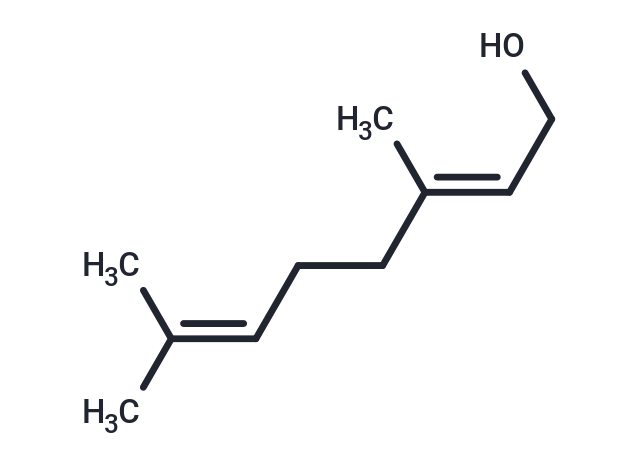Shopping Cart
- Remove All
 Your shopping cart is currently empty
Your shopping cart is currently empty

geraniol provides a potent protective effect against cardiac dysfunction induced by diabetes. This ameliorative effect could be attributed to its suppression of oxidative stress.

| Pack Size | Price | Availability | Quantity |
|---|---|---|---|
| 100 mg | $46 | In Stock | |
| 1 mL x 10 mM (in DMSO) | $50 | In Stock |
| Description | geraniol provides a potent protective effect against cardiac dysfunction induced by diabetes. This ameliorative effect could be attributed to its suppression of oxidative stress. |
| In vivo | Geraniol prevented any increase in QTc and T-peak-T-end intervals, and markers of LV ischemia and arrhythmogenesis, seen in diabetic animals. Geraniol suppressed the exaggerated oxidative stress as evidenced by preventing the increase in 8-isoprotane. In diabetic heart tissue, geraniol prevented the inhibition in catalase activity but did not affect the heart SOD. Geraniol partially reduced hyperglycemia, prevented the hypercholesterolemia, but did not affect the serum level of adiponectin in diabetic animals. |
| Animal Research | Diabetes was induced in rats by a single streptozotocin injection. In the treated group,geraniol (150mg/kg/day) was administered orally starting from the 15th day after induction of diabetes, and ending after 7 weeks; diabetic control rats were given vehicle for the same period. At the end of the study, cardiac contractility was assessed by using a Millar microtip catheter in anesthetised rats, and cardiac conductivity determined by a surface ECG. Serum levels of glucose, cholesterol, triglyceride and adiponectin as well as urine 8-isoprostane were determined |
| Molecular Weight | 154.25 |
| Formula | C10H18O |
| Cas No. | 106-24-1 |
| Smiles | C(\CCC=C(C)C)(=C/CO)/C |
| Relative Density. | 0.879 g/cm3 at 20℃ (lit.) |
| Storage | keep away from direct sunlight | Powder: -20°C for 3 years | In solvent: -80°C for 1 year | Shipping with blue ice. | |||||||||||||||||||||||||||||||||||
| Solubility Information | DMSO: 27.5 mg/mL (178.28 mM), Sonication is recommended. | |||||||||||||||||||||||||||||||||||
Solution Preparation Table | ||||||||||||||||||||||||||||||||||||
DMSO
| ||||||||||||||||||||||||||||||||||||

Copyright © 2015-2025 TargetMol Chemicals Inc. All Rights Reserved.